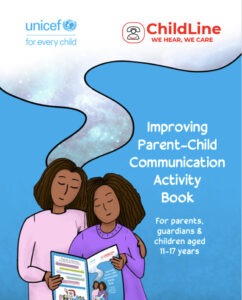The clock on the wall announces that it is 6:30 am on a Wednesday, and as you sip your morning tea, your child walks into the kitchen to open the fridge. There is no utterance of a “Good morning” nor any sort of acknowledgment of your presence, and as you bring to their attention their bad manners, you are immediately met with even more disrespect; a steups and a spat out “Good morning”.
For the past few months, bad attitude, reclusive actions, and anger has become common conduct from your child, causing you to feel completely stumped. What else does a child need more than a roof over their head, food on the table, and clothes on their back? Your mind picks apart ways to rationalize their behaviour—Is it puberty? Wasn’t depression one of the new trends among teens? Is it too much social media? Whatever it is, your child needs to grow up, stop looking for attention, and maybe get some lashings so that they can fall back into place. Right?
Realizing that your child may be experiencing issues with their mental health may be hard to accept. In your mind, there are worse problems out there than teenage angst; such as bills and adult responsibilities. But the developmental stage of a child, adolescent, or young adult is a precarious one, filled with ups and downs. Your child’s emotions may indeed be complex because of their specific developmental stage, but that does not make their feelings less real or important to them. Your child is still growing, still learning how to cope with life, and still learning how to navigate the world. Resist the immediate instinct to treat your child’s issues as insignificant and always remember that if your child feels as if they cannot talk to you, they may eventually seek out other avenues to cope that may be potentially dangerous or unhealthy.
Here are three tips:
- Healthy communication is important. Create an environment that allows your child to feel as if they can talk to you about things important to them.
- Be mindful of your tone. Dismissive, uninterested, annoyed, and negative tones can be hurtful to your child. When they reach out to you, they are hoping to be understood, not dismissed.
- Do not compare your child’s issues with others. It might seem easy to make light of your child’s issues because they might not compare to what you think is important. Try not to compare your child’s issues to anyone else’s, especially your own.
If you are struggling with parenting and want to seek support, you can contact any of the following:
- Families in Action: 628-6333
- Trinidad and Tobago Innovative Parenting Support: 662-8264 / 389-6928 / 385-4968
- Ministry of Social Development and Family Services’ Hotline: 800-1MSD
- The National Family Services Division: 794-7483 or 784-5538
If you believe that your child may be experiencing psychosocial issues, contact any of the following for support:
- ChildLine: 131 or 800-4321
- Children’s Authority: 996 or 800-2014








